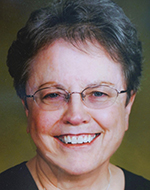Page Content
 We live in dystopian times. When Margaret Atwood originally published The Handmaid’s Tale, its exploration of a near-future society of repressive uniformity was scarcely to be credited; now it’s being serialized and taken seriously as one of several possible chilling futures.
We live in dystopian times. When Margaret Atwood originally published The Handmaid’s Tale, its exploration of a near-future society of repressive uniformity was scarcely to be credited; now it’s being serialized and taken seriously as one of several possible chilling futures.
The world order established in the ashes of the Second World War just when I was born seemed until recently to represent a stable force for good — people had learned the bitter lessons of history, we thought, so never again would the world be turned upside down as it had been in the first half of that century.
Yet all of a sudden here we are again, some 70 years later, watching the rise of neo-Nazis and extremists of all stripes, touting their wares in a cacophony of coarse voices full of venom and mudslinging, reveling in the unfiltered platform that social media afford them. They trade mutual insults and label as liars those who don’t fall in line with their particular agenda or feed their expansive egos. More and more they create a climate of insecurity and disrespect for others.
We are rapidly losing the settling sense of shared values. There seems to be less interest in incorporating into what often feels to be an abruptly unraveling society the values we thought we shared: wisdom, experience, good manners, forbearance, kindness, empathy, good citizenship, conscientious leadership. In the public arena, at least, people have stopped using their “listening ears.”
Many years ago, I joined a small group of parents and teachers to work towards establishing an alternative public school under the aegis of the Calgary Board of Education’s enlightened policies to enhance diversity and inclusiveness. Little did I know that that step would launch me on a path to taking out Canadian citizenship (I’m originally from he U.S.) in order to become eligible for election as a school trustee, to serving for six tumultuous years on the public school board in Calgary, to changing careers mid-life to take up the study of law, and finally to enjoying a satisfying career representing the Alberta Teachers’ Association and its members before courts and other tribunals for more than 20 years.
All of these experiences opened many windows for me into the recesses of public schools, their governance and the complexities of their operations, and engendered in me a lifelong commitment to the fundamental values of teaching and learning. But I am not naive. I witnessed (and participated in) many battles and struggles as all the players in the education system came (or were forced to come) to terms with each other, united at least by their commitment to children’s growth and development.
As I look back on all this and on my study of Alberta’s schools, one thing stands out sharply now: that Alberta’s public education system is, at its core, the result of political and social compromise of the sort that is so rare today. It is now hard to imagine the passions that undergirded the efforts of religious and linguistic minorities leading up to provincehood in 1905 to mold Alberta’s schools to serve their own interests, but the need for a more elaborate education system in a society marked by religious, cultural and language differences compelled them to compromise narrow interests and guarantee minority rights within Alberta’s constitution so that an effective school system could grow and thrive. It was a remarkable achievement, that compromise. (For more detail, see my chapter “Venerable Rights: Constitutionalizing Alberta’s Schools, 1869–1905” in the book Forging Alberta’s Constitutional Framework.)
And the Association itself, with its membership drawn from all segments of Alberta’s school system, has carried that achievement forward.
In the midst of a world fragmenting again into hostile factions, with demagogues at the gate, it is even more important to recognize how much we have to celebrate in the fact that Alberta’s teachers, students and parents have a school system whose basic historical structure was built on a great compromise and permits them to differ and dissent while giving them the tools and encouragement to maintain a truly civil and inclusive society.
Our schools are bulwarks against mob rule and important allies of those who believe in a tolerant and democratic community where various talents and identities are permitted to thrive and connect with each other.
My admiration for the teaching profession and its role in society only grows apace. It strikes me forcibly that teachers are the strongest beacons of light on today’s darkening horizon. Teachers who love learning and encourage their students to stretch themselves as caring individuals are more than ever essential to the continued existence of a tolerable world. ❚
Sandra M. Anderson is a retired labour and privacy lawyer who acted as counsel for the ATA and served as chair of the Calgary Board of Education.
